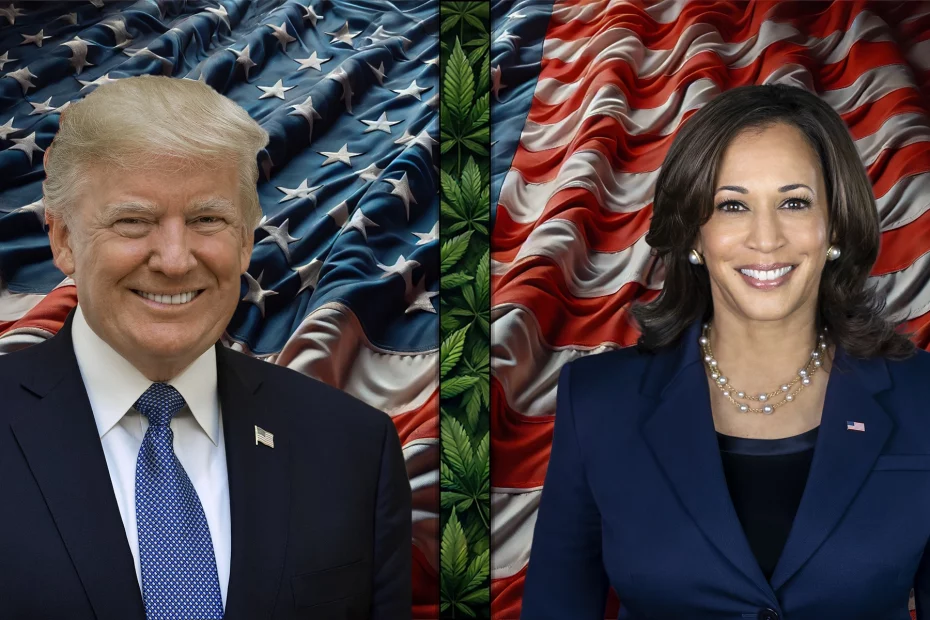As the election draws near, it becomes clear more Americans support legalizing weed at the national level than ever before. According to a January Pew survey, 57% of people agree marijuana should be legal for both medical and recreational purposes. Further, 32% think it should be legal only for medical use which leaves only 11% that oppose marijuana legalization entirely. While largely ignored by past presidents, it’s just too big to ignore this election season and has become a major point of discussion during the 2024 campaign. Let’s look at both Vice President Kamala Harris’ and former President Donald Trump’s positions so far.
Trump’s Stance on Marijuana Legalization
Donald Trump has not explicitly supported legalizing recreational weed nationwide as of our understanding. During his 2016 campaign, Trump suggested that marijuana legalization should be a state-level decision which may not mean he supports it directly but does imply he has no intention of halting the current progress either. In October 2015, he stated that it “should be a state issue, state by state.” His administration maintained the federal prohibition on marijuana use throughout his presidency.
In 2021, Trump proposed ending a federal policy that protected state medical marijuana programs from Justice Department intervention, potentially jeopardizing these programs nationwide. However, more recently, he has shown renewed support for marijuana reform at the state level. In September 2024, Trump announced that he would vote in favor of Florida’s Amendment 3, a ballot measure to legalize recreational marijuana. He stressed the importance of ending “needless arrests and incarcerations of adults for small amounts of marijuana for personal use.” On Truth Social, Trump stated, “As a Floridian, I will be voting YES on Amendment 3 this November.”
Trump now also supports expanding research into the medical uses of marijuana. He has backed moving marijuana from a Schedule I drug (high potential for abuse with no accepted medical use) to a Schedule III drug, which would place fewer restrictions on cannabis research. He stated that, if elected president, he would focus on expanding research and collaborating with Congress to pass common-sense marijuana laws, including safe banking for cannabis businesses and supporting state rights.
Kamala Harris on Marijuana Legalization
Kamala Harris has not made marijuana legalization a central issue of her campaign, but she has been vocal about her belief that the drug should no longer be criminalized. Harris has stated that “people should not be going to jail for smoking weed,” emphasizing that it’s time to legalize marijuana and end the criminalization of its use.
However, Harris’ past actions on marijuana as a prosecutor have been a point of criticism. As district attorney of San Francisco in the early 2000s, Harris prosecuted marijuana offenses when the drug was still illegal. Later, as California attorney general, she opposed recreational marijuana legalization. California ultimately legalized recreational marijuana in 2016, after Harris had moved on to serve as a U.S. senator.
As a senator, Harris’ views began to shift. By 2015, she expressed that she had “no moral objection” to legalizing recreational marijuana, and in 2019, she introduced legislation to federally legalize marijuana and expunge nonviolent cannabis offenses. Her stance now focuses on decriminalizing cannabis use and ensuring that those who have faced convictions for nonviolent marijuana offenses are given a path to expungement – a legal process which depending on location may remove or seal past offenses from the public.
Key Differences
The most significant difference between Trump and Harris’ positions on marijuana legalization lies in their focus. Trump has not committed to national legalization but instead emphasizes state rights and ongoing research into medical cannabis. Although he previously proposed ending federal protections for state medical marijuana programs, his current stance shows renewed support for state-level reform, such as Florida’s Amendment 3. Overall, his approach remains cautious, prioritizing research and allowing states to make their own decisions regarding legalization.
Harris, on the other hand, supports decriminalization and has pushed for federal legalization and expungement of nonviolent cannabis offenses. While she previously prosecuted marijuana offenses as a district attorney, her views have evolved significantly over the years, transitioning to advocating for reform at the federal level.
In short, Trump favors a state-by-state approach, allowing states to decide individually about legalization, while Harris is in favor of nationwide legalization and clearing records for those affected by past marijuana laws. Both have shown some level of support for cannabis reform, but their paths and priorities differ significantly.
Share your thoughts on the topic below – we’d love to hear your perspective! Please keep the discussion respectful and focused on the facts, as we’ve strived to do in this comparison. Our goal is to foster an informative conversation, so let’s keep it constructive. Happy voting!

